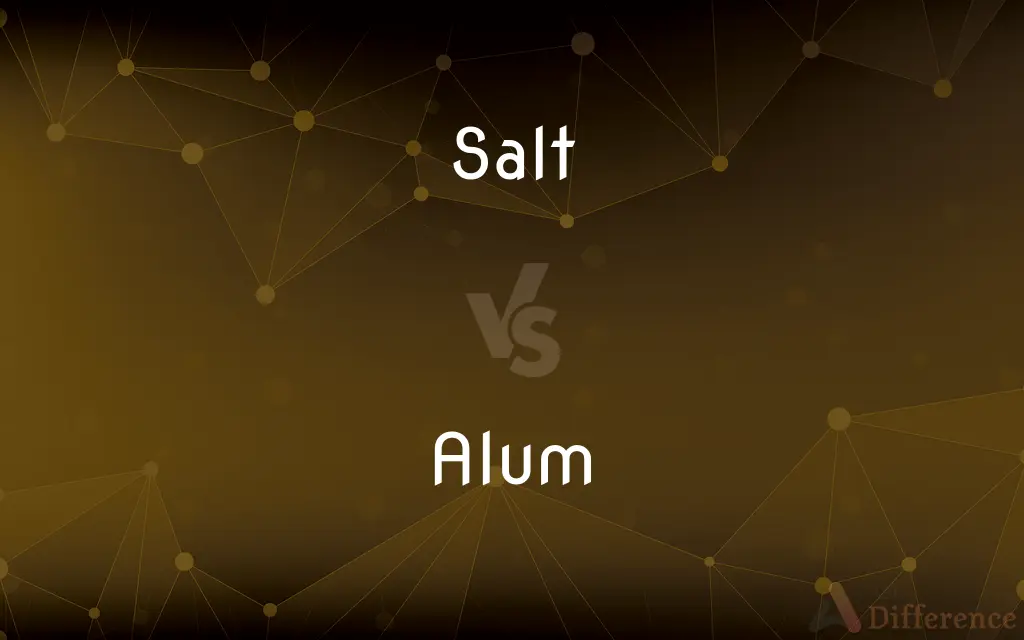Salt vs. Alum — What's the Difference?
By Maham Liaqat & Urooj Arif — Updated on March 25, 2024
Salt, primarily sodium chloride, is used for seasoning and preserving food, while alum, a double sulfate of aluminum and potassium, is used for water purification, in cosmetics, and as an astringent.

Difference Between Salt and Alum
Table of Contents
ADVERTISEMENT
Key Differences
Salt, chemically known as sodium chloride (NaCl), is an essential compound widely used in cooking as a flavor enhancer and in preserving food due to its ability to inhibit the growth of bacteria. Its role in human nutrition is critical, contributing to electrolyte balance and nerve function. On the other hand, alum, known for its chemical formula KAl(SO₄)₂·12H₂O, serves different purposes. It is commonly used in water purification processes to coagulate impurities, making them easier to filter out. Additionally, alum finds applications in the cosmetic industry, particularly in products like deodorants for its astringent properties that reduce perspiration, and in traditional medicine as a styptic to stop bleeding.
Salt is obtained either through the evaporation of seawater, known as sea salt, or by mining rock salt from underground deposits left by dried-up ancient lakes and seas. Alum, however, is usually synthesized through chemical processes, although it can also be found in its natural form in minerals such as alunite and kalinite.
In culinary contexts, salt is indispensable, enhancing the flavor of food and preserving it by drawing moisture out, which helps to inhibit the growth of microbes. Alum, while not used for flavoring, has been traditionally used in pickling recipes to maintain the crispness of fruits and vegetables, although its use has declined due to health concerns.
While both compounds have antibacterial properties, their applications diverge significantly. Salt's antibacterial action is primarily utilized in food preservation, whereas alum's astringent and antibacterial qualities are applied in personal care products and water treatment.
The health implications of both substances also differ. Consuming salt in moderate amounts is essential for health, but excessive intake can lead to health issues such as high blood pressure. Alum, being a chemical compound with aluminum, when used excessively in products applied to the skin, has raised concerns regarding potential health risks, although its occasional use in small quantities is generally considered safe.
ADVERTISEMENT
Comparison Chart
Primary Use
Seasoning, preserving food
Water purification, cosmetics, astringent
Chemical Formula
NaCl
KAl(SO₄)₂·12H₂O
Source
Sea water, rock deposits
Synthesized, mineral deposits
Role in Food
Flavor enhancer, preservative
Crispness in pickling (traditionally)
Health Implications
Essential in moderation, excess can lead to hypertension
Generally safe in small quantities, concerns over aluminum exposure
Compare with Definitions
Salt
Essential for human health, involved in nerve transmission and muscle function.
Athletes consume salt tablets to replenish electrolytes.
Alum
A double sulfate salt of aluminum and potassium, used in water purification.
Alum is added to water to clarify it by coagulating sediments.
Salt
Acts as a preservative by inhibiting bacterial growth.
Salt is used to cure meats and fish.
Alum
Traditionally used in pickling to keep fruits and vegetables crisp.
Alum was once common in pickling recipes to ensure crispness.
Salt
A mineral composed primarily of sodium chloride (NaCl), used as a seasoning and preservative.
She sprinkled salt over the fries to enhance their taste.
Alum
Used medicinally as a styptic to stop bleeding.
Alum blocks are applied to minor shaving cuts to stem bleeding.
Salt
An indispensable culinary ingredient worldwide.
Salt is considered a basic ingredient in kitchens around the globe.
Alum
Applied in cosmetics, especially as an astringent in deodorants.
Natural deodorants often contain alum for its antibacterial properties.
Salt
Obtained from sea water or mined from underground deposits.
Rock salt is mined from ancient sea beds.
Alum
Raises health concerns when used in large quantities due to aluminum content.
The use of alum in products is debated due to potential aluminum exposure risks.
Salt
A common substance, chemically consisting mainly of sodium chloride (NaCl), used extensively as a condiment and preservative.
Alum
An alum () is a type of chemical compound, usually a hydrated double sulfate salt of aluminium with the general formula XAl(SO4)2·12H2O, where X is a monovalent cation such as potassium or ammonium. By itself, "alum" often refers to potassium alum, with the formula KAl(SO4)2·12H2O. Other alums are named after the monovalent ion, such as sodium alum and ammonium alum.
Salt
Salt is a mineral composed primarily of sodium chloride (NaCl), a chemical compound belonging to the larger class of salts; salt in the form of a natural crystalline mineral is known as rock salt or halite. Salt is present in vast quantities in seawater.
Alum
Any of various double sulfates of a trivalent metal such as aluminum, chromium, or iron and a univalent metal such as potassium or sodium, especially hydrous aluminum potassium sulfate, AlK(SO4)2·12H2O, widely used in industry as clarifiers, hardeners, and purifiers and medicinally as topical astringents and styptics.
Salt
A usually whitish crystalline solid, chiefly sodium chloride, used extensively in ground or granulated form as a food seasoning and preservative. Also called common salt, table salt.
Alum
An alumna or alumnus.
Salt
An ionic chemical compound formed by replacing all or part of the hydrogen ions of an acid with metal ions or other cations.
Alum
An astringent salt, usually occurring in the form of pale crystals, much used in the dyeing and tanning trade and in certain medicines, and now understood to be a double sulphate of potassium and aluminium (K2SO4·Al2(SO4)3·24H2O).
Salt
Salts Any of various mineral salts used as laxatives or cathartics.
Alum
(chemistry) Any similar double sulphate in which either or both of the potassium and aluminium is wholly or partly replaced by other univalent or tervalent cations.
Salt
Salts Smelling salts.
Alum
A past attendee or graduate (of either gender) of a college, university or other educational institution.
Salt
Often salts Epsom salts.
Alum
(transitive) To steep in, or otherwise impregnate with, a solution of alum; to treat with alum.
Salt
An element that gives flavor or zest.
Alum
A double sulphate formed of aluminium and some other element (esp. an alkali metal) or of aluminium. It has twenty-four molecules of water of crystallization.
Salt
Sharp lively wit.
Alum
To steep in, or otherwise impregnate with, a solution of alum; to treat with alum.
Salt
(Informal) A sailor, especially when old or experienced.
Alum
A white crystalline double sulfate of aluminum: the ammonium double sulfate of aluminum
Salt
A saltcellar.
Alum
A white crystalline double sulfate of aluminum: the potassium double sulfate of aluminum
Salt
Containing or filled with salt
A salt spray.
Salt tears.
Alum
A person who has received a degree from a school (high school or college or university)
Salt
Having a salty taste or smell
Breathed the salt air.
Alum
A double sulphate of aluminum and potassium that is used as an astringent (among other things)
Salt
Preserved in salt or a salt solution
Salt mackerel.
Salt
Flooded with seawater.
Salt
Found in or near such a flooded area
Salt grasses.
Salt
To add, treat, season, or sprinkle with salt.
Salt
To cure or preserve by treating with salt or a salt solution.
Salt
To provide salt for (deer or cattle).
Salt
To add zest or liveliness to
Salt a lecture with anecdotes.
Salt
To give an appearance of value to by fraudulent means, especially to place valuable minerals in (a mine) for the purpose of deceiving.
Salt
(chemistry) One of the compounds formed from the reaction of an acid with a base, where a positive ion replaces a hydrogen of the acid.
Salt
(uncommon) A salt marsh, a saline marsh at the shore of a sea.
Salt
(slang) A sailor also old salt.
Salt
(cryptography) Randomly chosen bytes added to a plaintext message prior to encrypting or hashing it, in order to render brute-force decryption more difficult.
Salt
A person who seeks employment at a company in order to (once employed by it) help unionize it.
Salt
(obsolete) Flavour; taste; seasoning.
Salt
(obsolete) Piquancy; wit; sense.
Attic salt
Salt
(obsolete) A dish for salt at table; a salt cellar.
Salt
Epsom salts or other salt used as a medicine.
Salt
(figurative) Skepticism and common sense.
Any politician's statements must be taken with a grain of salt, but his need to be taken with a whole shaker of salt.
Salt
(Internet slang) Tears; indignation; outrage; arguing.
There was so much salt in that thread about the poor casting decision.
Salt
The money demanded by Eton schoolboys during the montem.
Salt
One who joins a workplace for the purpose of unionizing it.
Salt
A bounding; a leaping; a prance.
Salt
Salty; salted.
Salt beef;
Salt tears
Salt
Saline.
A salt marsh;
Salt grass
Salt
Related to salt deposits, excavation, processing or use.
A salt mine
The salt factory is a key connecting element in the seawater infrastructure.
Salt
Bitter; sharp; pungent.
Salt
Salacious; lecherous; lustful; (of animals) in heat.
Salt
Costly; expensive.
Salt
(transitive) To add salt to.
To salt fish, beef, or pork; to salt the city streets in the winter
Salt
(intransitive) To deposit salt as a saline solution.
The brine begins to salt.
Salt
To fill with salt between the timbers and planks for the preservation of the timber.
Salt
To insert or inject something into an object to give it properties it would not naturally have.
Salt
(mining) To blast metal into as a portion of a mine in order to cause to appear to be a productive seam.
Salt
(archaeology) To add bogus evidence to an archaeological site.
Salt
(transitive) To add certain chemical elements to (a nuclear weapon) so that it generates more radiation.
Salt
(transitive) To sprinkle throughout.
They salted the document with arcane language.
Salt
(cryptography) To add filler bytes before encrypting, in order to make brute-force decryption more resource-intensive.
Salt
To render a thing useless.
Salt
To sow with salt (of land), symbolizing a curse on its re-inhabitation.
In this place were put to the ground and salted the houses of José Mascarenhas.
Salt
(wiki) To lock a page title so it cannot be created.
Salt
The chloride of sodium, a substance used for seasoning food, for the preservation of meat, etc. It is found native in the earth, and is also produced, by evaporation and crystallization, from sea water and other water impregnated with saline particles.
Salt
Hence, flavor; taste; savor; smack; seasoning.
Though we are justices and doctors and churchmen . . . we have some salt of our youth in us.
Salt
Hence, also, piquancy; wit; sense; as, Attic salt.
Salt
A dish for salt at table; a saltcellar.
I out and bought some things; among others, a dozen of silver salts.
Salt
A sailor; - usually qualified by old.
Around the door are generally to be seen, laughing and gossiping, clusters of old salts.
Salt
The neutral compound formed by the union of an acid and a base; thus, sulphuric acid and iron form the salt sulphate of iron or green vitriol.
Salt
Fig.: That which preserves from corruption or error; that which purifies; a corrective; an antiseptic; also, an allowance or deduction; as, his statements must be taken with a grain of salt.
Ye are the salt of the earth.
Salt
Any mineral salt used as an aperient or cathartic, especially Epsom salts, Rochelle salt, or Glauber's salt.
Salt
Marshes flooded by the tide.
His fashion is not to take knowledge of him that is beneath him in clothes. He never drinks below the salt.
Salt
The act of leaping or jumping; a leap.
Salt
Of or relating to salt; abounding in, or containing, salt; prepared or preserved with, or tasting of, salt; salted; as, salt beef; salt water.
Salt
Overflowed with, or growing in, salt water; as, a salt marsh; salt grass.
Salt
Fig.: Bitter; sharp; pungent.
I have a salt and sorry rheum offends me.
Salt
Fig.: Salacious; lecherous; lustful.
Mine eyes are full of tears, I can not see;And yet salt water blinds them not so muchBut they can see a sort of traitors here.
Salt
To sprinkle, impregnate, or season with salt; to preserve with salt or in brine; to supply with salt; as, to salt fish, beef, or pork; to salt cattle.
Salt
To fill with salt between the timbers and planks, as a ship, for the preservation of the timber.
Salt
To deposit salt as a saline solution; as, the brine begins to salt.
Salt
A compound formed by replacing hydrogen in an acid by a metal (or a radical that acts like a metal)
Salt
White crystalline form of especially sodium chloride used to season and preserve food
Salt
Negotiations between the United States and the Union of Soviet Socialist Republics opened in 1969 in Helsinki designed to limit both countries' stock of nuclear weapons
Salt
The taste experience when salt is taken into the mouth
Salt
Add salt to
Salt
Sprinkle as if with salt;
The rebels had salted the fields with mines and traps
Salt
Add zest or liveliness to;
She salts her lectures with jokes
Salt
Preserve with salt;
People used to salt meats on ships
Salt
Containing or filled with salt;
Salt water
Salt
Of speech that is painful or bitter;
Salt scorn
A salt apology
Salt
One of the four basic taste sensations; like the taste of sea water
Common Curiosities
Are there health risks associated with using salt?
Yes, consuming excessive amounts of salt can lead to health issues such as high pressure in body and increased risk of heart disease.
Is it safe to consume alum?
Alum can be consumed in very small quantities, such as in traditional pickling processes, but its ingestion in larger amounts can be harmful due to its aluminum content.
What is the primary difference between salt and alum?
The primary difference is their chemical composition and uses; salt is mainly used for seasoning and food preservation, while alum is used in water purification, cosmetics, and as an astringent.
Why is alum used in deodorants?
Alum is used in deodorants for its astringent properties that minimize perspiration and its antibacterial action that reduces body odor.
Can both salt and alum have antibacterial properties?
Yes, both have antibacterial properties; salt through its dehydration effect on bacteria, and alum through its astringent and antibacterial actions.
What makes alum effective in water purification?
Alum acts as a coagulant, binding impurities in water together into larger particles that are easier to filter out, thereby clarifying the water.
Can alum be used in cooking like salt?
Alum is not typically used for flavoring like salt but has been used in pickling to maintain crispness of vegetables, though its culinary use is limited due to health concerns.
How is salt obtained?
Salt can be obtained by evaporating seawater or mining rock salt from underground deposits.
How does salt preserve food?
Salt preserves food by drawing moisture out, which inhibits the growth of bacteria and other microorganisms that cause food to spoil.
Is alum natural or synthetic?
Alum can be both; it occurs naturally in minerals like alunite and kalinite but is often synthesized for commercial use.
Share Your Discovery

Previous Comparison
Photogenic vs. Photographic
Next Comparison
Xenogenic vs. XenogeneicAuthor Spotlight
Written by
Maham LiaqatCo-written by
Urooj ArifUrooj is a skilled content writer at Ask Difference, known for her exceptional ability to simplify complex topics into engaging and informative content. With a passion for research and a flair for clear, concise writing, she consistently delivers articles that resonate with our diverse audience.














































